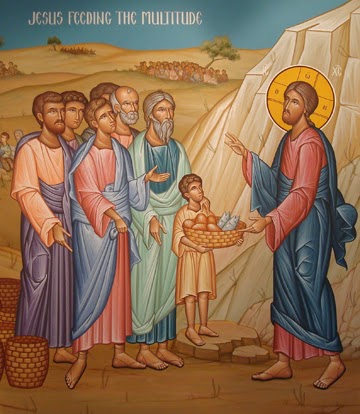4th Trinity August
Luke 9: 1-17
He called the twelve together and gave to them
potent authority and formative power, so that they could work against all
demonic mischief, and heal all sickness.
And he sent them out to heal and to proclaim the Kingdom of God,
appearing now on earth, the kingdom of human beings filled with God’s spirit.
And he said to them, “Take nothing with you on the
way: no staff for support, no bag for collecting, neither bread nor money, no
change of clothes. If you enter a house, remain there until you go further. And
where they do not accept you, leave their city and shake the dust from your
feet as a sign that they have refused community with you.”
They left and walked through the villages of the
country, announcing the joyful message of the new working of the kingdom of the
angels and healing everywhere.
Meanwhile Herod the Tetrarch heard of all that was
happening and he was very perplexed, for some said, “John is risen from the
dead,” and others said that Elijah had appeared, and yet others, “One of the
Prophets of old has risen again.” And Herod said, “John I have had beheaded;
who now is this, about whom I hear all these things?” And he wished to see him
himself.
And the apostles returned and reported to Jesus
everything that they had accomplished. So he gathered them to himself and
retreated with them to a city called Bethsaida for special
instruction. But the people became aware of it and followed him. He welcomed
them and spoke to them of the Kingdom of God of the future, of the human
kingdom on earth filled with the divine spirit, and he healed all who had need
of it.
But the day began to decline. The twelve came up to
him and said, “Send the crowd away so that they can reach the villages and
farms in the vicinity and find food and lodging, for here we are in a deserted
place.” He however said to them, “From now on it falls to you; you give them to
eat.”
They answered, “We have nothing but five loaves and
two fish. Or shall we go and buy food for all of them?“ There were about five
thousand people.
Then he said to the disciples, “Have them sit down
in groups of fifty”. And they did so, and all reclined.
Then he took the five loaves and the two fish and,
raising his soul to the spirit, gave thanks, broke them, and gave them to his
disciples to distribute to the people. And they ate, and all were satisfied.
And they took up the pieces that remained: twelve baskets full.
4th August Trinity
August 17, 2014
Luke 9: 1-17
Science has clearly demonstrated a link between the quality
of our thinking and our general health. Negative thoughts, constant worrying
and anxieties elevate the stress levels in our blood. They break down our
immune system and erode our wellbeing. Such negative, destructive thought
patterns are the working of demonic, hindering forces in us.
The gospel reading says that Christ gives his followers, his
students ‘potent authority and formative power ‘ over these demonic ,
ill-making mischief makers. This protection against the demonic is Christ
himself working in us, along with his angelic hosts. For we all carry him
within us. The potent authority he gives us is our ability to notice and
recognize those negative thoughts, those demonic workings within us, when they
arise. Just noticing them, naming them, weakens their hold, diminishes their
strength. Christ’s formative power in us is our ability to say no to negative
thoughts and worries, and to replace them with thoughts that are true, good and
beautiful.
All that the demonic forces can do is to try to
destroy. When we do the work of
recognizing our habitual false, evil, and ugly thoughts, when we work to
replace them with thoughts inspired by Christ’s angels, we can hope for the
grace of Christ’s blessing strength. We will partake of his nourishing of our
souls and spirits. For the good, the true and the beautiful have creative
power. They generate, they create more of themselves, deeper goodness, broader
truth, higher beauty. And so, as John O’Donohue says:
May the beauty of your life become more
visible to you, that you may glimpse your wild divinity.
May the wonders of the earth call you forth
from all your small, secret prisons and set your feet free in the pastures
of possibilities.
….
May you allow no dark hand to quench the
candle of hope in your heart.
…
May the outside voices of fear and despair
find no echo in you.
…
May the shelter and nourishment of all the
good you have done, the love you have shown, the suffering you have carried,
awaken around you to bless your life a thousand times.
And may you know that despite confusion,
anxiety and emptiness, your name is written in Heaven.[1]












